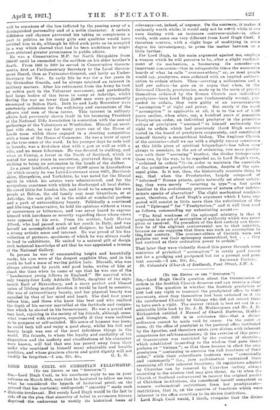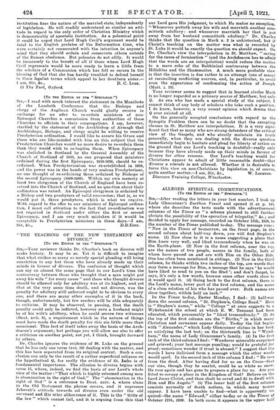Cro zaz EDITOR or rue &Tors:rim-1 Sin,—Lord Hugh Cecil's question
about the transmission of orders in the Scottish Church deserves and can receive a clear answer. The, question is whether the Scottish presbyters of 1560 had any right to transmit the presbyteral office to their successor; since they themselves had been ordained to it (in the unreformed Church) by bishops who did not intend them to have such a right. The answer (which is best set out in a admirable little book by Dr. J. II. Wotherspoos and Mr. J. 3i. Kirkpatrick entitled A Manual of Church Doctrine, Hodder and Stoughton, 1920) is in substance this—that a divine ordinance cannot be made void by canon. On the point it issue, (1) the office of presbyter is the pastoral office instituted by the Apostles, and therefore exists jure divine, with inherent competence for self-transmission; (2/ tho exercise of this power of transmission was restricted by the custom of ohurchei, which established (according to the wisdom God gave them) prelate* or " bishops"; so that these became in effect the only presbyters- " continuing to exercise the full functions of their order," while their subordinate brethren were "canonically and customarily" (Le., jure ecclesiastico) restrained from exercising all their inherent functions; (3) regulations adopted by Churches can be removed by Churches (acting always according to the wisdom God may give them). So (4) when the Church of Scotland endeavoured to recover the original purity of Christian institutions, she considered herself competent to remove ecclesiastical Lestrictions from her presbyterate- restrictions, that is, on the exercise of functions which were inherent in the office according to its divine institution.
Lord Hugh Cecil would, I think, reoogaize that the divine
institution fixes the nature of the married state, independently of legislation. He will readily understand so similar an atti- tude in regard to the only order of Christian Ministry which is demonstrably of apostolic institution. As a polemical point it could be urged that Lord Hugh Cecil's argument would be fatal to the English prelates of the Reformation time, who were certainly not consecrated with the intention in anyone's mind that they should ordain and consecrate others outside of the Roman obedience. But polemics do not edify. It would be immensely to the benefit of all if those whom Lord Hugh Cecil represents would be more ready to learn a little from the scholars of a Communion which has felt so secure in the blessing of God that she has hardly troubled to defend herself in those legalist terms which appeal to her Southern sister.—



































 Previous page
Previous page